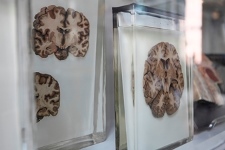Research
Driven by the idea that the most challenging problems concerning the human mind require the co-operation of numerous disciplines in brain science and the humanities, the Berlin School of Mind and Brain was founded in 2006 as an interdisciplinary graduate institution. Its mission is to train outstanding young scientists in the entire scope of mind and brain research and to sharpen the international profile of the research community in the greater Berlin area.
The graduate school’s faculty members with their groups of postdoctoral fellows and doctoral candidates focus on four cognitive topics: perception, attention and consciousness, decision-making, language, social cognition (human sociality and the brain), and on the two key determinants of any mental function: brain plasticity and lifespan ontogeny and brain disorders and mental dysfunction.
These six topics are closely interrelated by joint projects and embedded in basic and clinical research. Empirical research is being carried out in close connection with conceptual (philosophical) analyses of key terms such as “decision”, “free will” and “consciousness”, and with an evaluation of the ethical and anthropological consequences of this research. Furthermore, the rapidly evolving and tightly knit fields of cognitive modeling and computational neuroscience as well as basic and clinical research play a key role in the Mind and Brain research community.
Technological and scientific progress in the ‘brain sciences’ makes it possible to address empirically fundamental questions of the ‘mind sciences’. Research on language, human decision-making, consciousness, and game theory – to name just a few areas – can benefit from experimental approaches originally developed within the life sciences in general, and neurosciences in particular. Conversely, support from the ‘mind sciences’ is essential for this research both on the conceptual and the methodological level. It is difficult to see how the implications of brain research on, for example, “free will” and “consciousness”, can be evaluated in the absence of a coherent philosophical concept of consciousness or free will, respectively. With the Berlin School of Mind and Brain we have created the institutional setting for an intense cooperation between researchers from the different fields involved.



